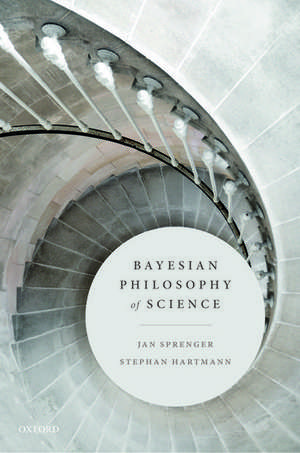Bayesian Philosophy of Science
Autor Jan Sprenger, Stephan Hartmannen Limba Engleză Hardback – 23 aug 2019
Preț: 646.76 lei
Preț vechi: 742.51 lei
-13% Nou
Puncte Express: 970
Preț estimativ în valută:
123.77€ • 134.40$ • 103.97£
123.77€ • 134.40$ • 103.97£
Carte tipărită la comandă
Livrare economică 11-17 aprilie
Preluare comenzi: 021 569.72.76
Specificații
ISBN-13: 9780199672110
ISBN-10: 0199672113
Pagini: 414
Dimensiuni: 161 x 240 x 31 mm
Greutate: 0.77 kg
Editura: OUP OXFORD
Colecția OUP Oxford
Locul publicării:Oxford, United Kingdom
ISBN-10: 0199672113
Pagini: 414
Dimensiuni: 161 x 240 x 31 mm
Greutate: 0.77 kg
Editura: OUP OXFORD
Colecția OUP Oxford
Locul publicării:Oxford, United Kingdom
Recenzii
For anyone with a serious interest in formal methods in the philosophy of science, this book is essential reading.
Bayesian Philosophy of Science gradually raises and broaches important and fascinating questions concerning the status, foundations, and limits of Bayesianism and Bayesian inference. Reading the entirety of this rich and stimulating book, which is both accomplished and forward-looking, is therefore rewarding and highly recommended.
Sprenger and Hartmann's Bayesian Philosophy of Science promises to become the new reference manual for all things Bayesian in the philosophy of science...For anyone with a serious interest in formal methods in the philosophy of science, this book is essential reading.
Detractors will read Sprenger and Hartmann's (hereafter S & H) Bayesian Philosophy of Science, because to my knowledge there is no other book that so effectively demonstrates the power and versatility of the Bayesian approach...The authors manage to cover a great deal of material, including material not typically discussed in introductions to Bayesian philosophy, such as the minimum divergence approach to probabilistic updating.
Bayesian Philosophy of Science gradually raises and broaches important and fascinating questions concerning the status, foundations, and limits of Bayesianism and Bayesian inference. Reading the entirety of this rich and stimulating book, which is both accomplished and forward-looking, is therefore rewarding and highly recommended.
Sprenger and Hartmann's Bayesian Philosophy of Science promises to become the new reference manual for all things Bayesian in the philosophy of science...For anyone with a serious interest in formal methods in the philosophy of science, this book is essential reading.
Detractors will read Sprenger and Hartmann's (hereafter S & H) Bayesian Philosophy of Science, because to my knowledge there is no other book that so effectively demonstrates the power and versatility of the Bayesian approach...The authors manage to cover a great deal of material, including material not typically discussed in introductions to Bayesian philosophy, such as the minimum divergence approach to probabilistic updating.
Notă biografică
Jan Sprenger is Professor of Philosophy of Science at the University of Turin. After completing an undergraduate degree in mathematics, he obtained his PhD in Philosophy at the University of Bonn in 2008. He then took up a post at Tilburg University, first working as Assistant Professor (2008-13) and subsequently as Full Professor (2014-17). He also directed the Tilburg Center for Logic, Ethics and Philosophy of Science (TiLPS). Sprenger's research and publications span a wide range of topics, mainly in philosophy of science and uncertain reasoning, but also in logic, group decision-making, and empirical work on human cognition.Stephan Hartmann is Professor of Philosophy of Science at LMU Munich, Alexander von Humboldt Professor, and Co-Director of the Munich Center for Mathematical Philosophy (MCMP). Between 2007 and 2012 he worked at Tilburg University, where he was Chair in Epistemology and Philosophy of Science and Director of the Tilburg Center for Logic and Philosophy of Science (TiLPS). Prior to this, he was Professor of Philosophy at the London School of Economics and Director of its Centre for Philosophy of Natural and Social Science. He was President of the European Philosophy of Science Association (2013-17) and President of the European Society for Analytic Philosophy (2014-17). Hartmann's primary research and teaching areas are philosophy of science, philosophy of physics, formal epistemology, and social epistemology. His current interests also include the philosophy and psychology of reasoning and argumentation.
